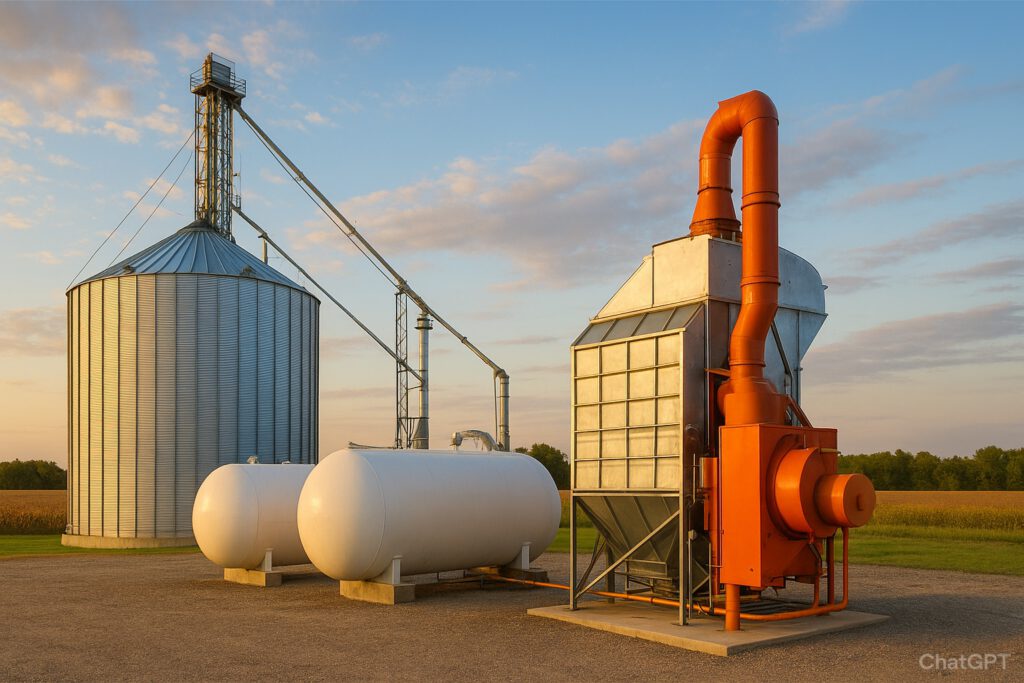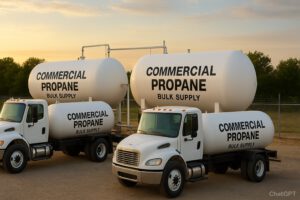
Efficient grain drying is critical for agricultural success, ensuring crop quality while maximizing storage life and market value. Propane-powered grain drying systems offer farmers and agricultural processors reliable, cost-effective solutions that optimize energy use and drying performance.
Understanding propane grain drying technology, from high-efficiency burners to automated controls, helps agricultural operations achieve optimal moisture removal while minimizing operational costs and environmental impact.
How Propane Grain Drying Works
Propane grain dryers use controlled heat and airflow to safely remove moisture from harvested grains, preparing them for long-term storage and processing.
The Drying Process
Successful grain drying requires precise control of temperature, humidity, and airflow to achieve optimal moisture content without damaging the grain.
Heat Generation
- Propane burners: Clean-burning fuel provides consistent, controllable heat
- Heat exchangers: Efficient transfer of heat to drying air
- Temperature control: Precise regulation prevents overheating
- Multiple heat zones: Graduated drying for different grain types
Airflow Management
- Centrifugal fans: High-volume air movement through grain columns
- Ducting systems: Optimized air distribution for even drying
- Air recirculation: Energy-efficient heat recovery systems
- Humidity control: Moisture removal and air quality management
Grain Types and Drying Requirements
Different grains require specific drying conditions to maintain quality and prevent spoilage during storage.
Corn Drying
- Target moisture: 13-15% for safe storage
- Temperature range: 100-160°F depending on variety
- Drying time: 4-8 hours per batch
- Energy efficiency: High BTU output required
Wheat and Small Grains
- Target moisture: 12-14% for milling quality
- Temperature range: 90-140°F for seed quality
- Drying time: 2-6 hours depending on initial moisture
- Gentle handling: Prevents cracking and quality loss
Soybeans and Oilseeds
- Target moisture: 11-13% for oil quality
- Temperature range: 110-150°F with careful control
- Drying time: 3-7 hours per batch
- Oil quality preservation: Prevents degradation
Types of Propane Grain Dryers
Modern propane grain drying systems offer various configurations to meet different agricultural operation needs and scales.
Batch Dryers
Batch dryers process grain in discrete loads, offering flexibility for small to medium-sized operations.
Stacked Batch Dryers
- Modular design: Multiple drying bins stacked vertically
- Batch processing: Load, dry, unload cycles
- Capacity range: 500-5,000 bushels per batch
- Energy efficiency: Heat recovery between batches
Single Batch Dryers
- Simple operation: Easy to use for small farms
- Cost effective: Lower initial investment
- Flexible scheduling: Dry when convenient
- Quality control: Precise moisture monitoring
Continuous Flow Dryers
Continuous flow systems provide high-capacity drying for large agricultural operations with steady grain flow.
Mixed-Flow Dryers
- High capacity: 1,000-10,000 bushels per hour
- Continuous operation: Steady grain processing
- Energy efficient: Counter-flow heat exchange
- Quality preservation: Gentle drying process
Cross-Flow Dryers
- Uniform drying: Even moisture removal
- High-volume processing: Large commercial operations
- Temperature control: Precise heat management
- Automation ready: Advanced control systems
Energy Efficiency and Cost Optimization
Propane grain drying systems offer superior energy efficiency compared to alternative fuels, providing cost-effective agricultural processing.
Propane Advantages
Propane’s energy density and clean-burning characteristics make it ideal for grain drying applications.
Energy Performance
- High energy content: 91,000 BTU per gallon
- Efficient combustion: 95%+ burner efficiency
- Clean burning: Minimal carbon residue
- Reliable supply: Consistent fuel quality
Cost Benefits
- Lower fuel costs: Competitive pricing per BTU
- Reduced maintenance: Clean combustion extends equipment life
- Quick startup: Instant heat availability
- Storage stability: Long-term fuel storage capability
Energy Optimization Strategies
Modern systems incorporate multiple strategies to maximize energy efficiency and minimize operational costs.
Heat Recovery Systems
- Heat exchangers: Capture waste heat for preheating
- Recirculation systems: Reuse heated air efficiently
- Multi-stage drying: Progressive heat utilization
- Insulation optimization: Minimize heat loss
Smart Controls
- Automated operation: Optimize drying based on conditions
- Load sensing: Adjust energy use to grain volume
- Weather integration: Use ambient conditions for efficiency
- Usage analytics: Track and optimize energy consumption
Automation and Control Systems
Modern propane grain dryers feature advanced automation that optimizes drying performance while ensuring grain quality.
Moisture Monitoring
Precise moisture measurement ensures grains reach optimal storage moisture without overdrying or underdrying.
Sensor Technology
- Capacitive sensors: Continuous moisture measurement
- Near-infrared sensors: Real-time quality assessment
- Load cell monitoring: Weight-based moisture calculation
- Temperature probes: Grain temperature tracking
Automated Controls
- PLC systems: Programmable logic controllers
- Touchscreen interfaces: User-friendly operation
- Data logging: Performance and quality records
- Remote monitoring: Off-site system management
Process Optimization
Advanced systems automatically adjust drying parameters for optimal results based on grain type and conditions.
Adaptive Drying
- Grain type recognition: Automatic parameter selection
- Moisture profiling: Adjust drying for varying moisture levels
- Energy optimization: Balance speed and efficiency
- Quality preservation: Prevent stress cracking and damage
Safety and Environmental Considerations
Propane grain drying systems incorporate comprehensive safety features and environmental protections for responsible agricultural operations.
Safety Systems
Multiple safety mechanisms protect operators and prevent accidents during grain drying operations.
Fire Prevention
- Spark detection: Automatic shutdown on ignition sources
- Temperature monitoring: Overheat protection systems
- Emergency shutdown: Manual and automatic safety controls
- Ventilation systems: Dust and gas removal
Operator Protection
- Gas detection: Propane leak monitoring and alarms
- Emergency stops: Accessible shutdown controls
- Guard systems: Protection around moving parts
- Training requirements: Certified operator programs
Environmental Compliance
Modern systems minimize environmental impact while meeting regulatory requirements for agricultural operations.
Emissions Control
- Clean combustion: Low-emission propane burners
- Dust collection: Air quality management systems
- Noise reduction: Quiet operation designs
- Energy efficiency: Reduced carbon footprint
Installation and Operation
Proper installation and operation ensure optimal performance and longevity of propane grain drying systems.
Site Selection and Installation
Strategic placement and professional installation maximize dryer efficiency and safety.
Location Requirements
- Foundation design: Stable, level concrete pads
- Utility access: Propane, electricity, and water connections
- Ventilation clearance: Proper exhaust and intake spacing
- Access considerations: Equipment and maintenance access
Professional Installation
- System integration: Coordination with grain handling equipment
- Electrical systems: Proper wiring and control installation
- Propane piping: Certified fuel system installation
- Testing and calibration: Pre-operation verification
Maintenance Programs
Regular maintenance ensures reliable operation and extends equipment lifespan.
Daily Maintenance
- Visual inspections: Check for leaks and damage
- Cleaning routines: Remove dust and debris
- Filter replacement: Air and fuel filter maintenance
- Lubrication: Moving parts and bearings
Seasonal Service
- Burner maintenance: Clean and adjust propane burners
- Control calibration: Verify sensor accuracy
- Structural inspection: Check for wear and corrosion
- Performance testing: Efficiency and safety verification
Economic Analysis and ROI
Propane grain drying systems offer compelling financial benefits through energy savings and improved crop value.
Cost Analysis
Comprehensive cost evaluation includes initial investment, operating expenses, and long-term savings.
Initial Investment
- Equipment costs: $50,000-$500,000 depending on capacity
- Installation expenses: $10,000-$100,000 for setup
- Infrastructure requirements: Buildings, foundations, utilities
- Training and certification: Operator education costs
Operating Costs
- Energy expenses: Propane fuel costs per bushel
- Maintenance costs: Annual service and parts
- Labor requirements: Operation and monitoring staff
- Insurance premiums: Equipment and liability coverage
Financial Benefits
Propane drying systems provide multiple financial advantages for agricultural operations.
Revenue Enhancement
- Quality preservation: Higher market prices for properly dried grain
- Storage flexibility: Extended storage periods without spoilage
- Processing efficiency: Faster drying reduces handling bottlenecks
- Crop insurance benefits: Improved coverage for stored grain
Cost Savings
- Energy efficiency: Lower drying costs per bushel
- Labor optimization: Automated systems reduce manual monitoring
- Maintenance reduction: Reliable equipment minimizes repairs
- Waste reduction: Minimize drying losses and spoilage
Future of Grain Drying Technology
Emerging technologies continue to enhance propane grain drying systems with greater efficiency and automation.
Innovation Trends
Advanced technologies are transforming grain drying operations for improved performance and sustainability.
Smart Technology Integration
- IoT connectivity: Remote monitoring and control
- AI optimization: Machine learning for process improvement
- Predictive maintenance: Equipment health monitoring
- Data analytics: Performance optimization insights
Sustainable Solutions
- Renewable propane: Bio-based fuel integration
- Energy recovery: Waste heat utilization systems
- Emission reduction: Advanced combustion technologies
- Water conservation: Efficient moisture removal processes
Making the Right Choice
Selecting the appropriate propane grain drying system involves evaluating operation scale, grain types, and budget considerations.
Assessment Factors
Several key considerations help determine the best grain drying solution for agricultural operations.
- Operation scale: Farm size and annual grain volume
- Grain types: Primary crops and drying requirements
- Budget constraints: Investment level and financing options
- Energy costs: Local propane pricing and availability
Implementation Strategy
Successful grain drying system adoption requires careful planning and professional support.
Planning Phase
- Capacity assessment: Determine drying requirements and timelines
- Site evaluation: Assess location suitability and infrastructure
- Vendor selection: Compare equipment options and support services
- Financial analysis: Calculate ROI and financing requirements
Next Steps
- Consult experts: Work with agricultural equipment specialists
- Request demonstrations: Test equipment performance in real conditions
- Obtain permits: Secure necessary local and environmental approvals
- Plan training: Ensure operator certification and safety training
Propane grain drying systems represent the future of efficient, reliable agricultural processing. Modern technology delivers the performance, safety, and cost-effectiveness that today’s farmers demand for successful crop management and storage.
About Jennifer Whitaker
Propane industry expert and content contributor for MyPropane.com.
View all posts by Jennifer Whitaker →Related Articles

Propane Warehouse Operations and Tank Monitoring: Complete Guide
Sep 18, 2025 • 7 min read
Optimize warehouse operations with propane-powered forklifts, automated tank monitoring, and efficient fuel management. Learn about cylinder exchange programs and smart…

Commercial Propane Contracts and Bulk Supply: Business Guide
Sep 17, 2025 • 9 min read
Learn about commercial propane contracts with volume pricing, automatic delivery scheduling, and dedicated account management for large-scale operations and bulk…